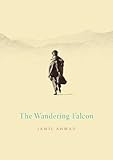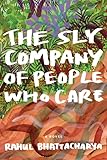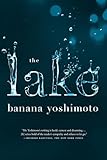Although an expanded total of seven books made the shortlist for this year’s Man Asian Literary Prize, the biggest news was probably one that didn’t: Haruki Marukami’s super-hyped but critically divisive 1Q84. Instead, Japan is represented on the shortlist by the much slimmer form of Banana Yoshimoto’s twelfth novel, The Lake.
The Wandering Falcon, written by octogenarian Jamil Ahmad, is the first Pakistani novel to be nominated, while other shortlisted subjects include a vivid history of Guyanese coolies, inter-generational conflict in South Korea, a seafaring epic in nineteenth century Canton, a Chinese blood-selling scandal, and arranged marriage in modern India. It’s a broad, engaging list, and probably all the better for not being dominated by such a powerful figure as Marukami. Here are the contenders that are still left standing:
 The Wandering Falcon by Jamil Ahmad: Ahmad, now almost eighty, spent much of his life working for the Pakistani Civil Service in its remote border regions: no-go zones that flash up on Western news reports as Taliban hidey-holes or the destination de rigeur of unmanned drones. The Wandering Falcon focuses on the tribes of those areas, casting overdue light on their deeply religious and honor-bound societies. Ahmad’s era may be pre-Taliban – he wrote the book thirty years ago, before being persuaded to seek publication by his wife – but his fractured tales, loosely based around the wanderings of Tor Baz, the eponymous Black Falcon, indicate a resistance to outside interference which would escalate in decades ahead. A masterpiece of focus and brevity, and brilliant in its evocation of an unforgiving landscape, Ahmad’s book is also now – for a book that came out thirty years late – remarkably timely.
The Wandering Falcon by Jamil Ahmad: Ahmad, now almost eighty, spent much of his life working for the Pakistani Civil Service in its remote border regions: no-go zones that flash up on Western news reports as Taliban hidey-holes or the destination de rigeur of unmanned drones. The Wandering Falcon focuses on the tribes of those areas, casting overdue light on their deeply religious and honor-bound societies. Ahmad’s era may be pre-Taliban – he wrote the book thirty years ago, before being persuaded to seek publication by his wife – but his fractured tales, loosely based around the wanderings of Tor Baz, the eponymous Black Falcon, indicate a resistance to outside interference which would escalate in decades ahead. A masterpiece of focus and brevity, and brilliant in its evocation of an unforgiving landscape, Ahmad’s book is also now – for a book that came out thirty years late – remarkably timely.
 The Sly Company of People Who Care by Rahul Bhattacharya: Bhattacharya won high praise for his book on Pakistani cricket, Pundits From Pakistan, which was published in 2005. Sly Company is a partly autobiographical picaresque of one young man’s journeys in Guyana, a nation with which the author fell in love during a previous cricket tour. Bhattcharya’s central character is retracing the steps of the boatloads who set sail from Calcutta and Madras in the mid-nineteenth century, lured by tales of a land of gold. The descendants of those so-called coolies as well as the emancipated slaves from Africa have created a unique, tempestuous nation which Bhattacharya succintly captures with his convincing – but at times almost impenetrable – mix of Rasta patois and Hindi movie references. Aiming only for a kind of inner fulfilment, his character hunts diamonds in the country’s thick, dark interior, then falls in love and heads for Venezuela. His adventures are underpinned by constant reminders of Guyana’s colonial past, and the heavy price it still pays for it.
The Sly Company of People Who Care by Rahul Bhattacharya: Bhattacharya won high praise for his book on Pakistani cricket, Pundits From Pakistan, which was published in 2005. Sly Company is a partly autobiographical picaresque of one young man’s journeys in Guyana, a nation with which the author fell in love during a previous cricket tour. Bhattcharya’s central character is retracing the steps of the boatloads who set sail from Calcutta and Madras in the mid-nineteenth century, lured by tales of a land of gold. The descendants of those so-called coolies as well as the emancipated slaves from Africa have created a unique, tempestuous nation which Bhattacharya succintly captures with his convincing – but at times almost impenetrable – mix of Rasta patois and Hindi movie references. Aiming only for a kind of inner fulfilment, his character hunts diamonds in the country’s thick, dark interior, then falls in love and heads for Venezuela. His adventures are underpinned by constant reminders of Guyana’s colonial past, and the heavy price it still pays for it.
 River of Smoke by Amitav Ghosh: River Of Smoke is the second novel in Ghosh’s planned trilogy, the first of which, Sea Of Poppies, was shortlisted for the Man Booker Prize in 2008. It’s an epic by any standards: 517 paperback pages, describing the early skirmishes which would ultimately lead to the 1840 Opium Wars, the Treaty of Nanking, and the secession of Hong Kong to British rule. Bahram, a Parsi trader from Bombay, seeks to land the enormous haul which will finally buy him the respect of his rich wife’s family back home. But the Chinese are determined to make trading in opium illegal, and as their crackdown becomes more unforgiving, so Bahram and the brigade of British merchants in whose company he has become inveigled must consider increasingly drastic options. It’s all a bit bogged down by an unnecessary sub-plot that is likely left over from his previous book. That said, Ghosh has written a story of such a grand scale that it deserves its opportunity to stand alone.
River of Smoke by Amitav Ghosh: River Of Smoke is the second novel in Ghosh’s planned trilogy, the first of which, Sea Of Poppies, was shortlisted for the Man Booker Prize in 2008. It’s an epic by any standards: 517 paperback pages, describing the early skirmishes which would ultimately lead to the 1840 Opium Wars, the Treaty of Nanking, and the secession of Hong Kong to British rule. Bahram, a Parsi trader from Bombay, seeks to land the enormous haul which will finally buy him the respect of his rich wife’s family back home. But the Chinese are determined to make trading in opium illegal, and as their crackdown becomes more unforgiving, so Bahram and the brigade of British merchants in whose company he has become inveigled must consider increasingly drastic options. It’s all a bit bogged down by an unnecessary sub-plot that is likely left over from his previous book. That said, Ghosh has written a story of such a grand scale that it deserves its opportunity to stand alone.
Rebirth by Jahnavi Barua: Rebirth is the only book on the shortlist for which overseas rights are yet to be granted. For that reason, if you manage to track down this book outside India, you’re a better literary detective than I. All of which is a shame, because reviews on the sub-continent suggest it is a delicate, deeply affecting novel deserving of wider readership. Set in modern-day Bangalore, Kaberi is pregnant with a longed-for child nobody else knows about: neither her estranged, unfaithful husband, nor her parents or friends. Rebirth takes the form of a monologue from mother to baby in which she expresses her doubts about her marriage and her life, and ultimately seeks, and finds, some form of redemption. In time, it’s likely its shortlisting will open it up to a bigger readership; for the time being, the next best thing is probably this comprehensive review via The Hindu Literary Review.
 Please Look After Mom by Kyung-Sook Shin: Kyung-Sook Shin is something of a literary phenomenon in South Korea. Please Look After Mom (Mother outside the US) is her seventh novel, and it has sold in excess of one million copies in her homeland. Maybe the most remarkable thing about her latest offering is how she manages to fashion something so unique and soul-searching out so ordinary a conceit. So-nyo, an ailing wife and mother, disappears on the Seoul subway on a trip from the country to visit her eldest son. Her siblings and their father join together in a futile quest to find her. In the course of their search – split between the points of view of son, daughter, father and finally, So-nyo herself – they agonise over how they took her for granted, and in doing so raise the kinds of questions that can apply to us all. Most of all, it offers rare glimpses of life in rural South Korea, and asks whether the nation’s insatiable push for progress has come at a price.
Please Look After Mom by Kyung-Sook Shin: Kyung-Sook Shin is something of a literary phenomenon in South Korea. Please Look After Mom (Mother outside the US) is her seventh novel, and it has sold in excess of one million copies in her homeland. Maybe the most remarkable thing about her latest offering is how she manages to fashion something so unique and soul-searching out so ordinary a conceit. So-nyo, an ailing wife and mother, disappears on the Seoul subway on a trip from the country to visit her eldest son. Her siblings and their father join together in a futile quest to find her. In the course of their search – split between the points of view of son, daughter, father and finally, So-nyo herself – they agonise over how they took her for granted, and in doing so raise the kinds of questions that can apply to us all. Most of all, it offers rare glimpses of life in rural South Korea, and asks whether the nation’s insatiable push for progress has come at a price.
 The Lake by Banana Yoshimoto: She’s big in Japan, inspiring a cult following and selling upwards of six million novels, but Banana Yoshimoto will always polarise opinion. Critics may be tempted to call her Murakami-lite, given her fondness for the same kind of broad subjects as her heavyweight compatriot – ultra-modern and slightly otherworldy paeans to urban restlessness. But that comparison probably doesn’t do Yoshimoto too much justice. Certainly, Murakami could learn from her brevity. The Lake revolves around the relationship between two fragile students, Chihiro and Nakajima. Nakajima bears the scars of a terrible past, and the plot – such as it is – concerns Chihiro’s attempts to figure him out (complete with a visit to a couple of Nakajima’s mysterious old friends who live in a run-down shack by the side of a conveniently misty lake). It has its moments, and her champions – of whom there are many – will doubtless shout her claims from the rooftops. But if this was the best book to come out of Asia this year then I’m – well – a Banana.
The Lake by Banana Yoshimoto: She’s big in Japan, inspiring a cult following and selling upwards of six million novels, but Banana Yoshimoto will always polarise opinion. Critics may be tempted to call her Murakami-lite, given her fondness for the same kind of broad subjects as her heavyweight compatriot – ultra-modern and slightly otherworldy paeans to urban restlessness. But that comparison probably doesn’t do Yoshimoto too much justice. Certainly, Murakami could learn from her brevity. The Lake revolves around the relationship between two fragile students, Chihiro and Nakajima. Nakajima bears the scars of a terrible past, and the plot – such as it is – concerns Chihiro’s attempts to figure him out (complete with a visit to a couple of Nakajima’s mysterious old friends who live in a run-down shack by the side of a conveniently misty lake). It has its moments, and her champions – of whom there are many – will doubtless shout her claims from the rooftops. But if this was the best book to come out of Asia this year then I’m – well – a Banana.
 Dream of Ding Village by Yan Lianke: Set in modern, rural China, Dream Of Ding Village addresses a topic of unimaginable grimmness: the story of the Chinese blood-selling scandal which swept an HIV epidemic through countless small communities, while the authorities, in thrall to the relatively new concept of controlled capitalism, looked away. The most extraordinary thing about Lianke’s tale – narrated by the murdered son of the man most culpable for this local tragedy – is his rich use of satire, creating an astonishing allegory of the whole bust-up Chinese communist machine and its clumsy lurch into the free market. With the villagers dying in scores, the rabidly profiteering blood-sellers must seek out ever more inventive ways to maintain their cash flow. Blackmail and corruption are rife: this is a society rendered hopelessly naïve by long years of bludgeoning single-party rule. Lianke is merciless in heaping the misery upon his subjects, and just as cutting in his implied criticism of his country. This is, no doubt, a terribly bleak book. In Lianke’s expert hands, however, it is also a very readable and eminently worthy one.
Dream of Ding Village by Yan Lianke: Set in modern, rural China, Dream Of Ding Village addresses a topic of unimaginable grimmness: the story of the Chinese blood-selling scandal which swept an HIV epidemic through countless small communities, while the authorities, in thrall to the relatively new concept of controlled capitalism, looked away. The most extraordinary thing about Lianke’s tale – narrated by the murdered son of the man most culpable for this local tragedy – is his rich use of satire, creating an astonishing allegory of the whole bust-up Chinese communist machine and its clumsy lurch into the free market. With the villagers dying in scores, the rabidly profiteering blood-sellers must seek out ever more inventive ways to maintain their cash flow. Blackmail and corruption are rife: this is a society rendered hopelessly naïve by long years of bludgeoning single-party rule. Lianke is merciless in heaping the misery upon his subjects, and just as cutting in his implied criticism of his country. This is, no doubt, a terribly bleak book. In Lianke’s expert hands, however, it is also a very readable and eminently worthy one.








